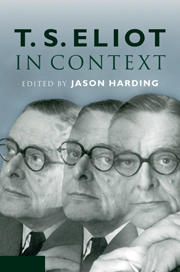Book contents
- Frontmatter
- Contents
- List of illustrations
- List of contributors
- Acknowledgements
- List of abbreviations
- Introduction
- PART ONE LIFE
- PART TWO FORMS
- PART THREE LITERARY CROSS-CURRENTS
- 16 Allusion: the case of Shakespeare
- 17 Classics
- 18 Dante
- 19 Seventeenth-century literature
- 20 Romantic and Victorian poetry
- 21 French poetry
- 22 Georgian poetry
- 23 Bloomsbury
- 24 Ezra Pound
- 25 The avant-garde
- PART FOUR POLITICS, SOCIETY AND CULTURE
- PART FIVE RECEPTION
- Further reading
- Index
25 - The avant-garde
Published online by Cambridge University Press: 05 August 2012
- Frontmatter
- Contents
- List of illustrations
- List of contributors
- Acknowledgements
- List of abbreviations
- Introduction
- PART ONE LIFE
- PART TWO FORMS
- PART THREE LITERARY CROSS-CURRENTS
- 16 Allusion: the case of Shakespeare
- 17 Classics
- 18 Dante
- 19 Seventeenth-century literature
- 20 Romantic and Victorian poetry
- 21 French poetry
- 22 Georgian poetry
- 23 Bloomsbury
- 24 Ezra Pound
- 25 The avant-garde
- PART FOUR POLITICS, SOCIETY AND CULTURE
- PART FIVE RECEPTION
- Further reading
- Index
Summary
In October 1915, four months after Eliot's precipitous wedding to Vivien Haigh-Wood in a London registry office, Bertrand Russell wrote to the poet's mother, evidently trying to allay her fears about Eliot's marriage and career prospects:
I have taken some pains to get to know his wife, who seems to me thoroughly nice, really anxious for his welfare … The chief sign of her influence that I have seen is that he is no longer attracted by the people who call themselves ‘vorticists’, and in that I think her influence is wholly to be applauded.
(L1, 129–30)Russell's remark was more prescient than he could have known: the year 1915 did prove to be a turning point in Eliot's outlook on poetry and poetics. The ‘vorticists’ to whom Russell alludes were members of a short-lived avant-garde group of poets and visual artists, led by Wyndham Lewis and Ezra Pound: the latter coined the term ‘vortex’ as the ‘point of maximum energy, the radiant node or cluster … from which, and through which, and into which, ideas are constantly rushing’. The Vorticist painters fused Cubist geometry with a Futurist emphasis on bodies and machines in motion: in the first issue of Lewis's Blast (July 1914), a 12-inch by 9-inch periodical whose texts were printed in oversize bold black type and bound in bright puce-coloured wrappers, England is ‘blasted’ for its allegiance to a stultified Victorian past, not to mention the country's cursed climate and other evils.
- Type
- Chapter
- Information
- T. S. Eliot in Context , pp. 252 - 262Publisher: Cambridge University PressPrint publication year: 2011



